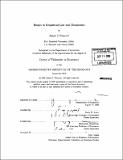Essays in empirical law and economics
Author(s)
Prescott, James J. (James Jondall)
DownloadFull printable version (10.20Mb)
Other Contributors
Massachusetts Institute of Technology. Dept. of Economics.
Advisor
David H. Autor and Michael B. Greenstone.
Terms of use
Metadata
Show full item recordAbstract
This thesis, which consists of three essays, uses empirical methods to study questions in criminal procedure and employment antidiscrimination law. The first chapter measures the consequences for offenders of expanding constitutional criminal jury trial rights. I study the Supreme Court's landmark decision in Apprendi v. New Jersey (2000), which extended beyond-a-reasonable-doubt jury factfinding (and all the costs and complications it entails) to particular facts previously decided by judges using a preponderance-of-the-evidence standard. The limited holding of Apprendi and the calculations required by the U.S. Sentencing Guidelines allow me to compare changes in the sentence lengths of groups of offenders who were differentially affected by the decision. I find that this expansion of jury trial rights benefited criminal offenders, reducing the average sentence for those most affected by more than 5 percent. The second chapter studies the prosecutorial charging response to the Supreme Court's Apprendi decision. (cont.) Using federal arrest, charging, and sentencing data to evaluate prosecutorial behavior, I find evidence that prosecutors reacted to the higher costs of factfinding by reducing the number of counts filed against affected defendants by as much as 10 percent, presumably magnifying the sentence reduction that would have occurred had prosecutors not substituted charging resources toward unaffected defendants. The third chapter, co-authored with Christine Jolls, examines the employment consequences of the American's with Disabilities Act's (ADA) two major features-the discrimination prohibition and the "reasonable accommodations" requirement. Several studies have suggested that the passage of the ADA might have reduced employment opportunities for individuals with disabilities, but which particular feature or features of the ADA, if any, caused this disemployment effect are unknown. (cont.) Using state-level variation in pre-ADA legal regimes to separately estimate the employment effects of the ADA's two substantive provisions, we find strong evidence that the immediate post-enactment employment effects of the ADA are attributable to the reasonable accommodations mandate rather than the firing costs associated with the antidiscrimination provision. Moreover, the pattern of effects across states suggests, contrary to prior findings, that declining disabled employment after the immediate post-ADA period may reflect factors other than the ADA.
Description
Thesis (Ph. D.)--Massachusetts Institute of Technology, Dept. of Economics, 2006. Includes bibliographical references.
Date issued
2006Department
Massachusetts Institute of Technology. Department of EconomicsPublisher
Massachusetts Institute of Technology
Keywords
Economics.